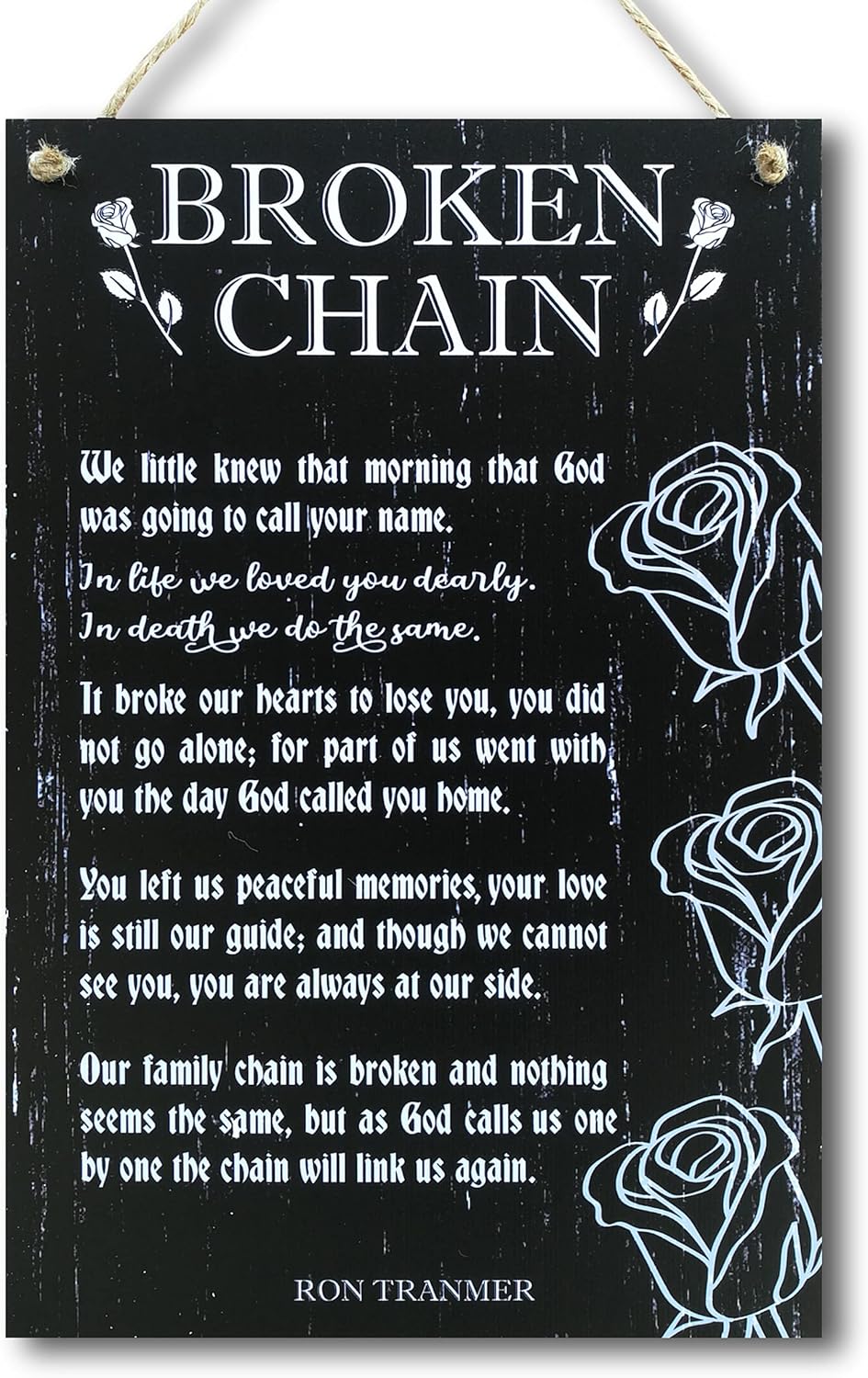
CARISPIBET Broken Chain | Poem memorial bereavement sympathy condolence funeral gift for loss of loved one 12" x 8"
FREE Shipping
CARISPIBET Broken Chain | Poem memorial bereavement sympathy condolence funeral gift for loss of loved one 12" x 8"
- Brand: Unbranded

Description
How to Write a Funeral Resolution - Easy Step-by-Step Guide to Help You Write an Amazing Resolution In the second stanza, the speaker admits that the people they left behind on Earth were brokenhearted when their loved one passed away. This is despite knowing that their loved one was going to have to live alongside God. But, the speaker notes that it gave them some solace to know that “you did not go alone.” A part of everyone who loved this person on Earth went along with them when “God called you home.” This is another example of a religious euphemism that refers to death. What is very important in this context is that the author does believe the family will be made whole again eventually, in the afterlife. Use Of The Broken Chain Poem In Sympathy And Memorial Gifts
The poem begins with the speaker directing their words to a specific listener, someone who has passed away. The speaker and their family members did not know that this person was going to die that day or “that God was going to call your name.” But, the speaker explains how everyone on Earth loves this deceased person in the same way they did when they were alive.
Throughout this poem, the poet makes use of several literary devices. These include but are not limited to: As the poem progresses, the speaker describes how everyone is devastated that this person has died, but they did not go to Heaven alone. Memories and love went with them, and one day they will all be reunited in Heaven at God’s side. The reference to the chain continues in the final couplet of the poem. The speaker says that the “chain will link again” as everyone who was a part of it during life dies and goes to God’s side. They are in the afterlife, and the speaker and their family members believe they were all be reunited and the “broken chain” will “link again. He goes on to explain that those loved ones we have lost do not go to heaven alone. Rather, as family members pass away, they are reunited again. What Does It Mean To Break The Chain?
Key Chain: What better gift than a keychain that the person will see each time they grab their keys to leave the house or drive a car? The poet does not use a specific metrical pattern throughout the four stanzas of this poem. But, there are some examples, in combination with the rhyme scheme, that suggests the poet is interested in the ballad or hymn form. This is seen through their near use of alternating lines of iambic trimeter and iambic tetrameter in some stanzas. The poem speaks to anyone who has lost someone. Why? Because e ven though you learn to move on and live without your loved one, you are never the same. Also important in this poem, however, is that the author believes that these family members will be reunited. The author clearly believes in an afterlife where the family will be made whole again. What Is The Lesson In The Poem? There are many beautiful bereavement gifts available that feature the Broken Chain poem. Consider some of these keepsakes as you look for a memorial gift to send to someone mourning their loved one. Author Ron Tranmer was born in Idaho in 1940. He is a self-proclaimed poet who reports writing his first poem at age 8 for a girl in his class. When the poem resulted in the recipient’s pleasure and smile, he kept writing. To date, he has published over 400 poems on traditional themes such as God, country, family, compassion, friendship, and humor.It is in the fourth stanza of the poem that the title’s reference to a “chain” is explored. It is also in the stanza that the speaker reveals that the person who has passed away was a family member. The speaker is expressing their emotions along with the emotions of other close family members.
The repetition of the word “you” continues in the second two lines of the stanza. The speaker says, using very simple and easy-to-understand language, that despite having passed away, the deceased person is “always at our side.” This is another commonly used phrase to describe the way that grieving loved ones remind themselves of the close bonds they formed with a person who has passed away.It is apparent that the speaker and his family members did not know the person was going to pass away because God unexpectedly “called his name.” However, the author explains that even though the person is no longer with them on earth, the love of the deceased person has not changed. A poem that speaks to many people, t he Unbroken Chain is a beautiful reminder that our bonds, relationships, and love do not have to end when someone passes away. In this poem, the speaker or author is speaking to the person who has passed away. Wall Art: Wall hangings could be a picture, a framed poster, or a wall tapestry to be used as a home decor memorial gift. Caesura: occurs when a poet inserts a pause in a line of verse. This could be through the use of punctuation or through a natural pause in the meter. For example, “In death, we do the same.”
- Fruugo ID: 258392218-563234582
- EAN: 764486781913
-
Sold by: Fruugo
